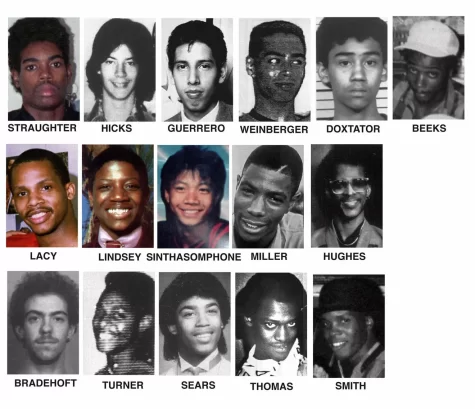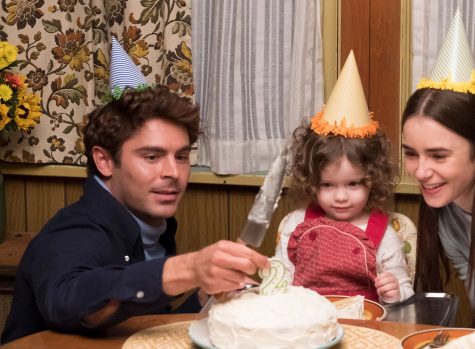Murders to Media: Hollywood’s Romanticization of Serial Killers
With its release on Sep. 21, “Dahmer – Monster: The Jeffrey Dahmer Story” became the most-watched Netflix series in its premiere week, beating “Squid Game” and “Bridgerton.” The show garnered over 496 million hours of stream-time within two weeks and with that a growing fanbase as well. Over the last few years Hollywood produced dozens of true crime movies and series such as “My Friend Dahmer,” “Lost Girls” and “No Man of God.”
However, despite many of these shows’ popularity, Hollywood’s excessive production of serial killer stories serves no other purpose than to glamorize the lives of murderers for entertainment and profit.
Although some of the films produced were intended to be historical recounts of killers’ stories, others weren’t created for the intention of being accurate. In the 2003 movie, “Monster,” the film depicts the case of serial killer Aileen Wuornos who murdered six different men from 1989 to 1990. According to the movie, Wuornos goes on her killing spree after being sexually assaulted and beaten by a man, leaving some viewers with the idea that Wuornos committed these crimes out of self-defense. Contrary to this portrayal, Wuornos in reality actually admits during her trial that the men she murdered were innocent and there was no self-defense involved. Despite this misrepresentation, “Monster” still claimed itself to be “based on a true story.” The inaccuracies in true crime films, especially for the sake of making a storyline more appealing, contributes to misinformation and distorted perceptions of real individuals.

Hollywood’s fascination with the “misunderstood villain” trope isn’t uncommon, but the fabrication of films based on real events has harmful effects on not only its viewers but also the victims and their families. For Wuornos, her victims’ families have their sons painted as sexual assaulters or “deserving of their death” because of the film. For others, the surplus of films produced forces victims and their families to relive their trauma.
In an Insider essay based on Rita Isbell’s conversation with Kelsey Vlamis, Isbell conveys to Insider a disheartening response to the recent Dahmer Netflix series. Isbell’s brother, Errol Lindsey, was one of Dahmer’s victims. At the 1992 court sentencing, Isbell delivered a victim impact statement which was recreated in the Netflix series without her knowledge. Isbell said that watching the show “brought back all of the emotions” she felt at the time and when she saw herself on the screen, it bothered her. She criticizes the show for not considering the feelings of the victims and claims it to be evidence of Netflix’s greed and exploitation of a tragedy.
I’m not telling anyone what to watch, I know true crime media is huge rn, but if you’re actually curious about the victims, my family (the Isbell’s) are pissed about this show. It’s retraumatizing over and over again, and for what? How many movies/shows/documentaries do we need? https://t.co/CRQjXWAvjx
— corbin bleu’s tether (@ericthulhu) September 22, 2022
Although not every depiction has the intention of being harmful, the endless production of true crime stories can have a dangerous impact on viewers. Films based around Ted Bundy often have the most unintentional negative effects on viewers with their castings for Bundy. Zac Efron and Chad Michael Murray, both considered to be attractive in the acting world, played Bundy in separate movies about the serial killer. While it’s true that these castings may be intentional to display how charming Bundy was perceived in real life, continuously starring Bundy as the main character of these films has the potential to humanize his character.
A majority of “Extremely Wicked, Shockingly Evil and Vile,” a film with Efron as Bundy, displays the serial killer as an endearing character. In the film, Bundy is seen as a loving partner to his long-term girlfriend Elizabeth Kendall and a supportive father-figure to Kendall’s daughter. Although it’s intended to show how misleading Bundy could be, the film merely presents Bundy as an attractive and normal person for a majority of the time and a psychopath for the minority. The storytelling poorly presents his life story, causing viewers to mistakenly feel empathy towards Bundy’s character. Hollywood needs to shift their focus on the victims and how their lives were adversely impacted because of these murders instead of continuously depicting serial killers as the main character. While names of Ted Bundy, Jeffrey Dahmer and other infamous murderers are cemented in American culture, the lives and names of their victims aren’t treated with the same interest. Most of the time, victims are generalized together and their stories are always overshadowed by their killer’s.

However, this doesn’t mean that every single true crime film or series is bad. From educating viewers about the criminal justice system to causing individuals to be more vigilant, true crime is a vital form of content that society needs. True crime content also allows for victims and their families to have an outlet to share their stories to others. According to a poll by YouGov from early September, over 50% of the people surveyed agreed that true crime helps people understand and empathize with victims more. Although that may be true to some degree, graphic true crime content, especially ones exaggerated for entertainment, desensitizes viewers to both on-screen and off-screen violence. The Encyclopedia of International Media and Communications explains that repeated exposure to violence in media decreases the emotional response of viewers and this can cause individuals to be more hesitant to report violence or feel less sympathy for victims of abuse.
Hollywood’s obsession with these films and unnecessary mass production of them needs to stop. With each rehash and remake, there’s a clear necessity for society and the world of entertainment to understand that a victim’s trauma should never serve as another person’s entertainment.













